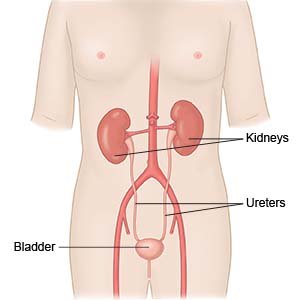Bladder Fulguration
Medically reviewed by Drugs.com. Last updated on Aug 4, 2025.
Bladder fulguration is a procedure to destroy abnormal growths or tissue. The procedure may be used to treat problems such as cystitis or some forms of cancer. Your healthcare provider will use a laser or electrocautery device to create energy. The energy makes heat that destroys tissue.
 |
DISCHARGE INSTRUCTIONS:
Seek care immediately if:
- You have severe pain in your bladder or abdomen.
- Your abdomen becomes tender and hard.
- Your urine turns from pink to red, or you have clots in your urine.
- You cannot urinate and your bladder feels full.
Call your doctor or urologist if:
- You have problems urinating.
- You urinate less than usual, or still feel like you have to urinate after you use the bathroom.
- You have a fever.
- Your pain or burning during urination becomes worse or lasts longer than 1 day.
- Your urine stays pink for longer than 1 day.
- You have nausea or are vomiting.
- You have questions or concerns about your condition or care.
Related medications
Medicines:
You may need any of the following:
- Antibiotics help prevent or treat a bacterial infection.
- Medicine will be given to prevent a burning feeling when you urinate. The medicine will make your urine turn orange or blue. This is normal.
- Prescription pain medicine may be given. Ask your healthcare provider how to take this medicine safely. Some prescription pain medicines contain acetaminophen. Do not take other medicines that contain acetaminophen without talking to your healthcare provider. Too much acetaminophen may cause liver damage. Prescription pain medicine may cause constipation. Ask your healthcare provider how to prevent or treat constipation.
- Take your medicine as directed. Contact your healthcare provider if you think your medicine is not helping or if you have side effects. Tell your provider if you are allergic to any medicine. Keep a list of the medicines, vitamins, and herbs you take. Include the amounts, and when and why you take them. Bring the list or the pill bottles to follow-up visits. Carry your medicine list with you in case of an emergency.
Self-care:
- Get more rest. Rest when you need to while you heal. Slowly start to do more each day. Return to your daily activities as directed. Your healthcare provider will tell you when it is okay to drive.
- Drink more liquids. Ask your healthcare provider how much liquid you should drink each day, and which liquids are best for you.
- Apply a warm, damp washcloth over your urethral opening. This may help to relieve discomfort.
- Do not have sex until your healthcare provider tells you it is okay. Sex may increase your risk for a urinary tract infection.
Follow up with your doctor or urologist as directed:
Write down your questions so you remember to ask them during your visits.
© Copyright Merative 2025 Information is for End User's use only and may not be sold, redistributed or otherwise used for commercial purposes.
The above information is an educational aid only. It is not intended as medical advice for individual conditions or treatments. Talk to your doctor, nurse or pharmacist before following any medical regimen to see if it is safe and effective for you.
Further information
Always consult your healthcare provider to ensure the information displayed on this page applies to your personal circumstances.
